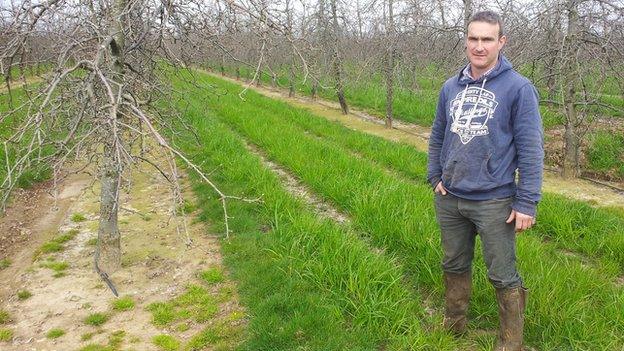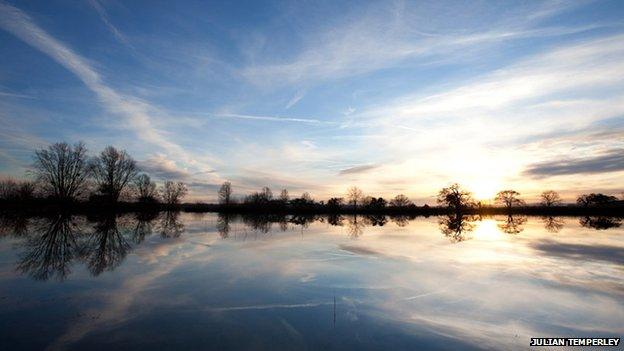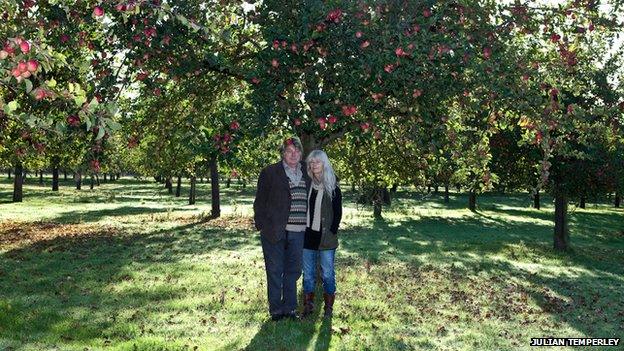Storm-hit cider producers face uncertain future
- Published

Standing water from the recent heavy rainfall had to be pumped out of the Herefordshire orchards owned by Kier Rogers
One of the wettest winters in memory has flooded England's orchards and left its cider industry facing an uncertain future. Now the Chancellor has decided to freeze duty on ordinary cider to help producers. But what damage has the weather done?
Thousands of acres of farmland vanished under water during the recent floods. Among them were about half of England's prime cider apple-producing orchards in Herefordshire and Somerset.
Cider apple trees and floodwater do not mix, as Julian Temperley, who has 170 acres of orchards at Kingsbury Episcopi, near Martock in Somerset, knows to his cost.
He said the flooding had been "a severe problem" and growers would not know until the spring whether their orchards had been destroyed by the winter storms.
"We've had an appalling late December, January and February - trees over the whole of the South West have taken a hammering," he said.
"There's certainly a big worry about waterlogged trees - there will be a considerable number dying.
"We have one orchard that's been under a foot of water... I'm not certain if the trees will survive."
Walking around the Herefordshire orchards owned by Kier Rogers it is easy to see the effects of the recent flooding.

Kier Rogers is waiting to see how much damage has been caused to his orchards
Farm tracks are pitted with suspension-threatening ruts and potholes and the earth around the trees still has a greenish tinge from the standing water.
Mr Rogers' orchards are protected from the nearby River Wye by flood defences, but the recent heavy rain has brought a fresh problem.
His farm lies in a loop of the river and the 10in (25cm) of rain that fell on the Midlands in January and February, according to Met Office figures, have raised the water table, saturating the soil so rainwater cannot drain away.
"We've had surface water here since the end of December when it started raining - and that causes me great concern - I don't know what the long-term effects on the trees, and the damage we will see this year," he said.
Taking me around his orchards, he anxiously looks at the emerging buds on the trees that have been flooded.
Last year he lost hundreds of trees and he must now wait to see what damage this year's deluge has done.
"They took 15 years to grow and now they get lost to saturated soils," he said.
Rob Collins, an apple grower and horticultural contractor who helps run an apprenticeship scheme in cider growing at Herefordshire and Ludlow College's Holme Lacy Campus, explained that if the trees stand in waterlogged soil or standing water for more than 14 days it kills off the roots.
"It is the fibrous roots that can't be seen by the naked eye that are affected the worst," he said.
"These are the roots that do all the work and are the most vulnerable to being killed off [by water] - they need to breathe."
The time when the tree is flowering is the most "energy sapping", he said, and if the roots have died it "gets so far and then can't survive".

Some orchards in Somerset were under a foot of water during the recent floods
The problem is made worse, he said, by a bacteria which thrives in standing water and is attracted to tree roots "speeding up the dying process".
"The thing is you don't realise it's happened until half way through the season, and with flood damage the tree will die very quickly," he added.
This means growers whose orchards have been flooded or waterlogged face a ticking time bomb.
They will not know the extent of damage until May or June, when their trees could either produce apples as normal or die virtually overnight.
The National Association of Cider Makers is preparing for the worst but hoping for good news.
"Many [producers] will lose trees that will need to be replanted," said Paul Bartlett, its chairman.
"We hope for the best, though recognise that the potential impact could seriously affect the income of growers this season and for several years to come."
Bill Wiggin, MP for North Herefordshire, knows the importance of apple growing and cider production to his rural constituency.

Julian Temperley is worried the floods will persuade tourists not to visit Somerset this year
Herefordshire manufacturer Bulmers have 10,000 acres of orchards and 180 farmers growing apples for them on contract - 30% of the apples grown in the UK go into their cider, the company said.
Mr Wiggin's call for the cider duty escalator, which automatically raises the amount of tax on the drink in the budget, to be scrapped was heeded by the Chancellor in his budget.
"With some cider makers in the West Country hit hard by the recent weather, I am going to help them by freezing the duty on ordinary cider," George Osborne announced.
Mr Bartlett said it was "great news" the chancellor has recognised the impact on growers and cider makers of the winter storms and rain.
"It protects the investment [growers] have made over many years to grow the industry and support the rural community, as well as supporting thousands of jobs."
Meanwhile, as the waters recede on the Somerset levels, Mr Temperley, said cider producers had another worry - the impact of the floods on tourism.
"The cider culture of our part of England has a considerable number of small farms making cider," he said.
"We are affected not just by the trees dying but by people not coming to the area.
"People have to be persuaded to come back to Somerset, which they're not doing at the moment."
- Published19 March 2014
- Published6 March 2014
- Published27 March 2013
- Published17 February 2014